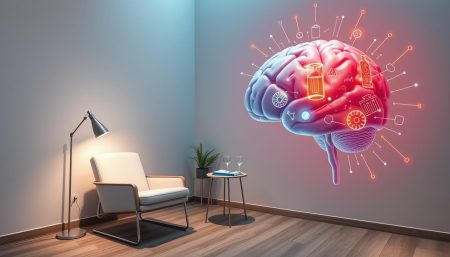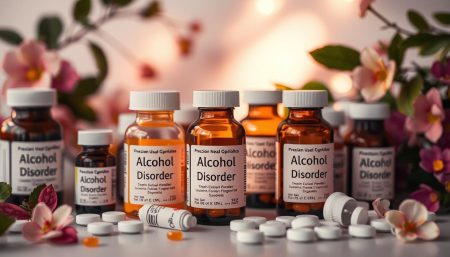The journey to overcome alcohol addiction is tough, both in mind and body. Gabapentin, a drug usually for seizures and pain, is now seen as a hope for AUD treatment. It might offer a new way to recover, avoiding some common treatment issues.
Experts are finding that treating AUD needs a mix of approaches. Gabapentin has shown to help by easing withdrawal and supporting early sobriety. It’s seen as a safer choice, with fewer risks and different side effects, helping some patients more.
Gabapentin is a fresh, adaptable option in addiction treatment. This article will dive into how gabapentin could change recovery for those with AUD. It could make a big difference in their lives.
Key Takeaways
- Gabapentin is being explored as a promising new treatment for managing symptoms of alcohol use disorder.
- It may offer advantages over traditional medications in the alcohol addiction recovery process.
- Research has highlighted its potential to reduce withdrawal symptoms and promote early abstinence.
- Gabapentin’s unique effect on the central nervous system plays an integral role in mitigating alcohol withdrawal symptoms.
- Careful monitoring is essential, due to the potential for misuse or abuse of gabapentin.
Understanding Alcohol Use Disorder
Alcohol Use Disorder (AUD) affects millions worldwide. It shows through symptoms and behaviors linked to alcohol abuse and alcohol dependence. This section aims to explain AUD, its symptoms, how common it is, and its effects on people and society.
AUD symptoms can vary but often include a strong craving for alcohol. People with AUD may find it hard to control their drinking. They might keep drinking even when it causes problems. Spotting these signs early is key for helping them get better.
- Persistent desire to drink
- Inability to cut down or control alcohol use
- Spending a lot of time obtaining, using, or recovering from alcohol
- Cravings, or a strong desire to use alcohol
The table below shows how common AUD is in different age groups. It highlights how widespread this disorder is in our society.
| Age Group | Percentage (%) |
|---|---|
| 18-29 | 10.4 |
| 30-44 | 7.6 |
| 45-59 | 6.5 |
| 60+ | 3.2 |
Learning about alcohol dependence and alcohol abuse is important. It helps us support those affected. By understanding AUD’s wide impact, we see why new treatments like gabapentin are crucial for recovery.
The Role of Medication in Treating Alcohol Dependency
Managing alcohol dependency is key to better patient care. Medications help by easing withdrawal symptoms and cravings. They are a vital part of alcoholism treatment. Yet, traditional meds have their limits.
Traditional Medications and Their Limitations
Medications like Disulfiram, Naltrexone, and Acamprosate are used to help control drinking. They can prevent relapse but may have side effects. Their success also depends on sticking to the treatment plan, which can be hard.
Why Gabapentin is Gaining Attention
Gabapentin is seen as a new hope in treating alcoholism. It’s used for neurological issues and is now being used for alcohol treatment. It’s safe and helps reduce cravings and drinking.
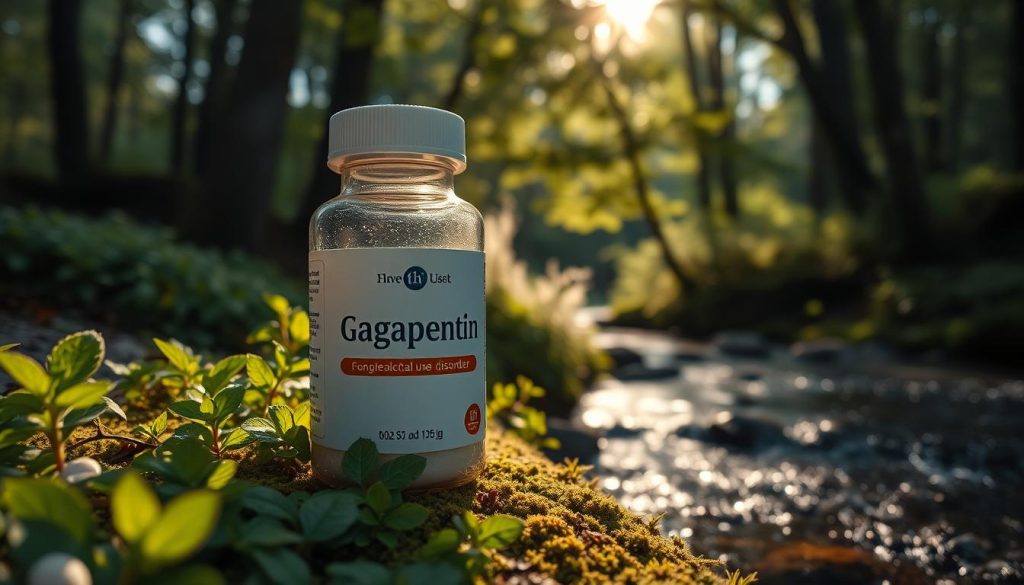
Gabapentin works by changing how GABA signals are sent in the brain. This is different from older drugs. It might have fewer side effects, making it a better choice for treating alcoholism.
| Medication | Mechanism | Common Side Effects | Characteristic Benefits |
|---|---|---|---|
| Disulfiram | Enzyme Inhibition | Headache, Fatigue, Skin Rash | Creates aversion to alcohol |
| Naltrexone | Receptor Blockade | Nausea, Headache, Dizziness | Reduces cravings |
| Acamprosate | Neurotransmitter Modulation | Diarrhea, Itching, Fatigue | Stabilizes chemical balance in brain |
| Gabapentin | GABA Modulation | Somnolence, Dizziness, Peripheral Edema | High tolerability, effective craving reduction |
Gabapentin is becoming a top choice for treating alcoholism. It offers a new way to fight addiction. It’s a better option for those who have tried other treatments or need something more effective and safe.
Gabapentin: Mechanism of Action Against AUD
Gabapentin is effective against alcohol use disorder (AUD) because of its unique way of working in the brain. It offers a new approach compared to traditional treatments. Gabapentin helps reduce symptoms of gabapentin alcohol withdrawal and helps prevent relapse.
Neurological Impact on Craving and Withdrawal
Gabapentin works by changing the GABA transmitter in the brain. GABA helps calm brain activity. This change reduces cravings and withdrawal symptoms in people recovering from AUD.
It also improves sleep and lowers anxiety. These are important factors that can lead to relapse.
How Gabapentin Differs from Other Anti-Craving Medications
Gabapentin is different because it affects more than just the reward pathway in the brain. It works on various neurotransmitter pathways. This makes it a versatile tool for managing AUD, not just cravings.
To learn more about gabapentin’s role in treating AUD, check out this detailed examination. It provides a deep dive into how gabapentin’s unique properties make it a promising treatment for AUD.
| Medication | Target Neurotransmitter | Primary Function |
|---|---|---|
| Gabapentin | GABA, others | Reduces cravings, eases withdrawal, improves sleep and anxiety levels |
| Other Anti-Craving Medications | Dopamine | Primarily blocks or substitutes addictive substances |
Gabapentin’s action on multiple neurotransmitters helps manage gabapentin alcohol withdrawal and prevent relapse. This makes it a valuable treatment option for AUD.
Gabapentin for Alcohol Withdrawal Symptoms
Managing withdrawal symptoms is key to beating alcohol dependence. Gabapentin is a big help in this fight. It eases the physical and mental pain of withdrawal.
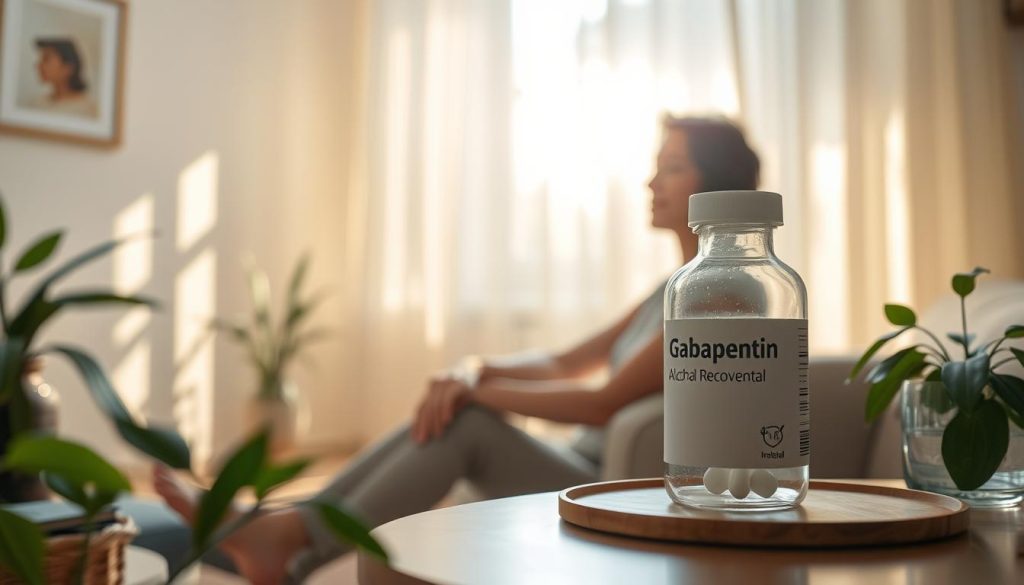
Gabapentin alcohol withdrawal management works by calming the nervous system. This system is often upset by alcohol use. Gabapentin helps with symptoms like agitation, anxiety, and insomnia.
- Reduces anxiety and depression
- Lessens physical symptoms like sweating and tremors
- Helps control cravings that can lead to relapse
Gabapentin makes withdrawal more comfortable and helps in long-term recovery. It keeps mood stable and cravings low. Always follow a doctor’s advice when using gabapentin.
“Gabapentin has been a game-changer in managing withdrawal symptoms and has significantly eased my path towards recovery.” – Patient testimonial
Using gabapentin for alcohol withdrawal, under a doctor’s watch, makes detox easier. This helps people stay sober for the long haul.
Case Studies: Gabapentin’s Effectiveness for Alcoholism Treatment
This section looks at real data and personal stories. It shows how gabapentin helps people with alcohol use disorder. We learn about gabapentin’s role in treating alcoholism through clinical trials and personal stories.
Success Stories from Clinical Trials
Many studies have shown gabapentin’s success in cutting down alcohol use. In one study, people took different doses of gabapentin for 12 weeks. Those on higher doses drank less and felt better overall.
Personal Accounts and Testimonials
Personal stories also highlight gabapentin’s benefits. People say it reduces cravings and helps with withdrawal symptoms. This makes recovery easier for them.
| Participant | Dosage | Reduction in Alcohol Consumption | Improvement in Quality of Life |
|---|---|---|---|
| Case #1 | 900 mg/day | 75% | Significant |
| Case #2 | 1200 mg/day | 85% | Substantial |
| Case #3 | 600 mg/day | 50% | Moderate |
These stories and studies prove gabapentin’s value in treating alcoholism. They offer hope and a way forward for those struggling.
An Overview of Gabapentin Alcoholism Treatment Regimen
Treating alcoholism needs a mix of psychological help and medicine. Gabapentin is a drug that helps a lot in recovery. This part explains how gabapentin is used in alcoholism treatment.
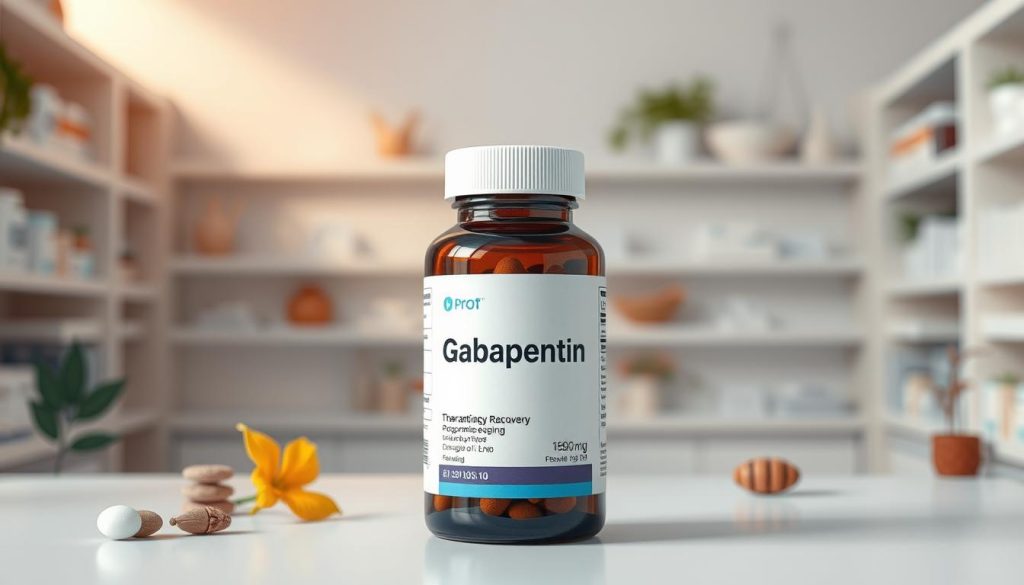
The treatment starts with checking the patient’s health and how bad their alcohol problem is. Gabapentin helps by reducing cravings and the chance of going back to drinking. The amount and how long someone takes gabapentin can change a lot. It depends on their health, how much they drank, and how they react to the treatment.
| Phase | Dosage | Duration | Purpose |
|---|---|---|---|
| Initial | 300 mg per day | 1 week | To assess tolerance and response |
| Adjustment | 600 mg per day | 2-3 weeks | Incremental adjustment based on patient response |
| Maintenance | 900 to 1200 mg per day | Variable | Long-term management of cravings and withdrawal symptoms |
The table shows a common plan, but every person’s gabapentin treatment regimen is different. Doctors adjust the treatment based on each person’s needs and to avoid side effects.
Gabapentin is just one part of a bigger plan to help people stay sober. This plan also includes therapy, support groups, and other ways to keep someone on the path to recovery. The main goal is to help people manage withdrawal and live a sober life for good.
How Gabapentin Supports Long-Term Recovery
Recovering from alcohol use disorder (AUD) needs a mix of treatments, with medicine being key. Gabapentin is seen as a helpful tool in gabapentin relapse prevention. It’s becoming a key part of treatment plans to keep people sober.
Preventing Relapse with Gabapentin
Gabapentin helps prevent relapse by changing how the brain works. It can lower cravings and reduce the chance of going back to drinking. Doctors adjust the dosage for each patient to make it work best.
Maintaining Sobriety: A Lifelong Journey
Staying sober is a lifelong effort, and gabapentin can help. It aids in the transition from recovery to long-term sobriety. This is done with gabapentin, therapy, and changes in lifestyle.
| Strategy | Description | Role of Gabapentin |
|---|---|---|
| Individual Therapy | Regular sessions focusing on cognitive behavior and emotional support | Enhances emotional regulation, aids in coping mechanism |
| Group Support | Meetings with peers for shared experiences and recovery challenges | Helps mitigate feelings of isolation, provides a community context for recovery |
| Lifestyle Changes | Includes diet, exercise, and sleep hygiene | Supports overall well-being, complements pharmacological effects of gabapentin |
Adding gabapentin to a recovery plan is a complete treatment approach. As recovery grows, the need for gabapentin might lessen. But its role in stabilizing mood and reducing urges is crucial in many stories. So, using gabapentin for long-term recovery boosts health chances and helps people live a sober, happy life.
Gabapentin Alcohol Dependence: Analyzing the Risks
When we talk about gabapentin alcohol dependence treatment, knowing the risks is key. This is important for doctors and patients alike. It helps make sure gabapentin is used safely and effectively to treat alcohol dependency.
Gabapentin was first used for nerve pain and epilepsy. But it also helps with alcohol dependence. Yet, there are risks like misuse and dependency. It’s crucial to tackle these issues to help patients and keep them safe.
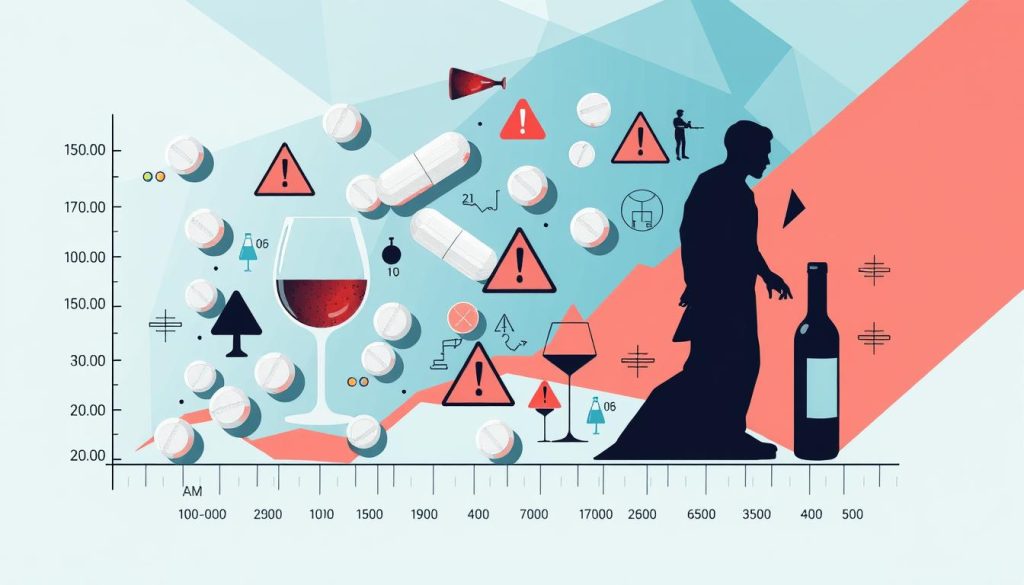
- Risk of developing dependency on gabapentin, especially when used in unsupervised settings.
- Potential for misuse by patients with a history of substance abuse disorders.
- The necessity for careful monitoring during treatment to manage and mitigate side effects.
It’s important to carefully look at the risks of using gabapentin for alcohol dependence. If you’re taking gabapentin or thinking about it, talk to your doctor a lot. This way, any misuse or bad effects can be caught and fixed quickly.
In the end, gabapentin is a good tool against alcohol dependence. But, like all medicines, it needs careful handling. This ensures it works well and doesn’t cause harm.
Comparing Gabapentin to Other Anti-Craving Medication
Looking into treatments for alcohol use disorder, we see gabapentin has big advantages. It works well and is safe. This makes it a top choice for both patients and doctors.
Evaluating Efficacy and Safety Profiles
The gabapentin safety profile shines because it has a low risk of addiction. It also has fewer serious side effects than other treatments. Here’s a comparison with two other common drugs.
| Medication | Efficacy in Reducing Cravings | Common Side Effects | Risk of Dependency |
|---|---|---|---|
| Gabapentin | High | Dizziness, Fatigue | Low |
| Naltrexone | Moderate | Nausea, Headache | None |
| Baclofen | Varies | Muscle Weakness, Dizziness | Moderate |
Why Patients and Doctors Choose Gabapentin
Gabapentin is popular because it helps with withdrawal symptoms and cravings. It’s different from other treatments that only focus on one part of addiction. This makes it better for treating addiction overall.
Doctors also like gabapentin because it’s safe. It works well for people with different health issues and other medicines. This makes it a great choice for fighting alcohol use disorder.
The Pros and Cons of Gabapentin for Alcohol Abuse
Looking into the benefits and drawbacks of gabapentin for alcohol abuse gives us a detailed view. It helps us see its role in treating addiction. This part talks about the good and bad sides of gabapentin. It aims to help both people and doctors decide if it’s right for treatment plans.

- Benefits of Gabapentin for Alcohol Abuse:
- It cuts down on cravings for alcohol, which lowers the chance of going back to drinking.
- It helps with withdrawal symptoms, making it easier to get through the recovery process.
- It also helps with sleep problems caused by alcohol, which can improve recovery overall.
- Drawbacks of Gabapentin for Alcohol Abuse:
- It can cause side effects like dizziness, tiredness, and mood swings. These can make it hard to go about daily tasks.
- It’s not good for everyone, especially those with kidney problems.
- It needs to be watched closely by doctors to avoid becoming dependent on it.
Gabapentin might be helpful in treating alcohol abuse, but knowing its benefits and drawbacks is key. Every person’s situation is different. So, it’s important to look at each case carefully, considering the person’s specific needs and health history.
Gabapentin as a Component of Comprehensive AUD Treatment
Gabapentin is a key part of treating AUD. It helps with the physical side of addiction. It also makes behavioral therapies and support systems work better. This is key for lasting recovery.
Integrating Therapy and Support Groups
Gabapentin works well with therapy and support groups for AUD. It can lower cravings and make withdrawal symptoms less severe. This makes therapy more effective.
Being in support groups with gabapentin leads to better results. People are more likely to stick with treatment and stay motivated.
Lifestyle Changes and Coping Strategies
Healthy lifestyle changes are vital in fighting AUD. Gabapentin makes it easier to adopt new coping strategies. These strategies help keep people sober for the long term.
These strategies include better nutrition, more exercise, and managing stress. Together, they form a complete recovery plan.
Let’s see how gabapentin helps in these areas:
| Aspect of Recovery | Impact of Gabapentin Integration | Additional Support Required |
|---|---|---|
| Therapy Sessions | Enhances receptiveness and engagement | Regular monitoring by healthcare professionals |
| Support Group Meetings | Increases compliance and active participation | Consistent attendance and engagement |
| Lifestyle Modifications | Facilitates easier adoption of healthy habits | Ongoing motivation and guidance from lifestyle coaches |
Note: Each strategy complements the other, creating a well-rounded approach to treating AUD effectively.
Understanding the Side Effects of Gabapentin
Gabapentin is a helpful drug for managing alcohol use disorder. But, it’s important for patients and doctors to know about its side effects.
Common Adverse Reactions Patients Should Know
People taking gabapentin might feel different side effects. These can be mild or severe. Here are some common ones:
- Dizziness and drowsiness, impacting day-to-day activities
- Headaches and blurred vision, often troubling during initial treatment phases
- Peripheral edema (swelling of extremities), which may cause discomfort and mobility issues
- Gastrointestinal upset, including nausea and vomiting
- Changes in mood, which may manifest as increased anxiety or swings in emotion
Managing Side Effects: Tips from Healthcare Providers
Healthcare providers have tips to help manage gabapentin side effects. These tips are based on what works best for each patient.
- Maintaining open communication with healthcare professionals to adjust dosages or explore alternative treatments if severe side effects occur
- Implementing gradual dose adjustments to minimize the impact of side effects
- Monitoring and reporting any new or worsening symptoms promptly
- Ensuring adequate hydration and following dietary recommendations to alleviate gastrointestinal distress
- Engaging in light exercise, with medical guidance, to reduce edema and improve overall well-being
Managing gabapentin side effects is key to treating alcohol use disorder. It shows how important it is to tailor treatment plans to each patient.
| Side Effect | Management Strategy |
|---|---|
| Dizziness | Adjust dosages; ensure patient safety at home and work environments |
| Blurred Vision | Regular eye check-ups, limiting activities that require clear vision until symptoms improve |
| Swelling of Limbs | Light exercise and elevation of limbs to reduce swelling |
| Nausea | Adequate hydration and small, frequent meals |
| Mood Changes | Therapy, counseling, or a review of medication regimen |
Real-Life Challenges and Success with Gabapentin Alcohol Addiction Recovery
The journey to sobriety is unique for everyone, especially those using gabapentin alcohol addiction recovery methods. We look at real-life success stories and the challenges people face during their recovery.
Recovering from alcohol addiction is a rollercoaster ride with highs and lows. Success often comes from a mix of medical help, therapy, and personal drive. Gabapentin has been a game-changer for many.
Starting gabapentin treatment can be tough, with withdrawal symptoms and adjusting to the medication. But, gabapentin helps reduce cravings and ease withdrawal symptoms, offering hope for recovery.
- Increased Stability: Many see a big drop in withdrawal symptoms, leading to a more stable recovery.
- Reduced Cravings: Gabapentin helps control cravings, a key factor in staying sober long-term.
- Improvement in Sleep Patterns: Gabapentin also improves sleep, a crucial aspect of recovery that’s often overlooked.
While gabapentin recovery is challenging, it’s also filled with personal growth and success. Here, we dive deeper into real-life scenarios that show gabapentin’s transformative power:
“Using gabapentin was key in my fight against alcohol. It made a huge difference, letting me focus on my therapy and healing.” – A recovery story from a rehabilitation center’s review.
These stories show gabapentin’s crucial role in effective recovery, marking it as a vital tool against alcohol dependence. They highlight individual strength and the need for comprehensive treatment plans in beating addiction.
With gabapentin and tailored recovery programs, people can fight addiction more effectively. They get both medical and psychological support. The journey is tough, but with the right tools and support, success and a sober life are possible.
gabapentin for alcohol use disorder: A Closer Look at the Research
In the fight against Alcohol Use Disorder (AUD), gabapentin research shines as a beacon of hope. It shows gabapentin could be a key part of AUD treatment. This section dives into the science behind gabapentin’s role in AUD therapy.
Studies have looked at gabapentin’s effect on AUD in different groups. They focus on how it helps with withdrawal and managing alcohol dependence. By studying these, we learn about gabapentin’s success and how it works in treatment.
“Gabapentin shows promising results in reducing alcohol consumption and prolonging abstinence.”
The core of gabapentin research is its effect on addiction’s neurological pathways. Studies show gabapentin affects GABA neurotransmitters and calms the nervous system. This leads to fewer cravings and withdrawal symptoms.
| Study | Focus | Outcome |
|---|---|---|
| Study A | Effect of gabapentin on withdrawal symptoms | Significant reduction in symptoms |
| Study B | Long-term sobriety rates | Improved sobriety up to 12 months |
| Study C | Comparison with placebo in relapse prevention | Lower relapse rates in gabapentin group |
These AUD treatment studies prove gabapentin’s value in AUD recovery. They highlight gabapentin’s benefits and help improve treatment plans for better patient results.
Gabapentin’s role in AUD treatment is backed by its safety. This makes it suitable for many patients. Ongoing research into gabapentin’s effects is deepening our understanding of its role in addiction medicine.
Conclusion
We’ve looked closely at gabapentin for alcohol use disorder. It’s a key player in fighting AUD. Gabapentin helps with withdrawal symptoms and can help manage cravings over time. It’s a big part of a treatment plan that fits each person’s needs.
Dealing with AUD needs a broad approach. Gabapentin is a part of that. It helps not just in the short term but also in building long-term recovery. It’s about more than just easing symptoms; it’s about helping people stay sober for good.
Gabapentin is a standout in fighting AUD. It helps with withdrawal and supports long-term recovery. As research grows, gabapentin’s role in helping people recover will likely get even stronger.
FAQ
Q: What makes gabapentin a promising option for alcohol use disorder?
A: Gabapentin is seen as a hopeful treatment for alcohol use disorder. It helps reduce cravings and ease withdrawal symptoms. These are key for lasting recovery from alcohol addiction.
Q: What is Alcohol Use Disorder (AUD) and what impact does it have?
A: Alcohol Use Disorder is a condition where people can’t stop or control their alcohol use. It leads to health and social problems. It affects both individuals and society greatly.
Q: In what ways is gabapentin gaining attention in alcoholism treatment?
A: Gabapentin is becoming a new hope in treating alcoholism. It works as an anti-craving medication. Its fewer side effects and unique action make it stand out.
Q: Can gabapentin assist with alcohol withdrawal symptoms?
A: Yes, gabapentin helps with alcohol withdrawal symptoms. These symptoms can be severe and even dangerous. It makes detox easier and reduces the risk of seizures.
Q: Are there any success stories or clinical evidence supporting gabapentin for alcoholism treatment?
A: Many studies and personal stories show gabapentin’s success. It helps reduce heavy drinking and prevent relapse in those with AUD.
Q: What does a gabapentin treatment regimen typically involve?
A: Gabapentin treatment plans vary. They often include a specific dosage plan. The goal is to lessen withdrawal symptoms and cravings.
Q: How does gabapentin contribute to long-term recovery from alcohol dependence?
A: Gabapentin helps with long-term recovery by preventing relapse and reducing cravings. It also improves overall well-being. This helps patients stay sober and participate in support therapies.
Q: What are the risks associated with using gabapentin for alcohol dependence?
A: Risks include sedation, dizziness, and misuse in those with substance abuse history. But, when used carefully, gabapentin is safe and effective for AUD treatment.
Q: How does gabapentin compare to other anti-craving medications?
A: Gabapentin has a better safety profile and works differently than other medications. It’s a good choice for those who haven’t responded to other treatments.
Q: What are the potential side effects of gabapentin that patients should be aware of?
A: Side effects include dizziness, sleepiness, water retention, and coordination issues. Healthcare providers can help manage these side effects.
Q: Can gabapentin be integrated into a comprehensive approach to treating AUD?
A: Absolutely. Gabapentin is a valuable part of AUD treatment. It works with behavioral therapies, support groups, and lifestyle changes for sobriety.
Q: How effective is gabapentin in real-life scenarios of alcohol addiction recovery?
A: Real-life stories show gabapentin’s success in alcohol addiction recovery. It’s effective as part of a broader treatment plan for many.
Q: What does the research say about gabapentin’s use for alcohol use disorder?
A: Studies and trials show gabapentin’s effectiveness for AUD. It reduces drinking, eases withdrawal symptoms, and prevents relapse.













